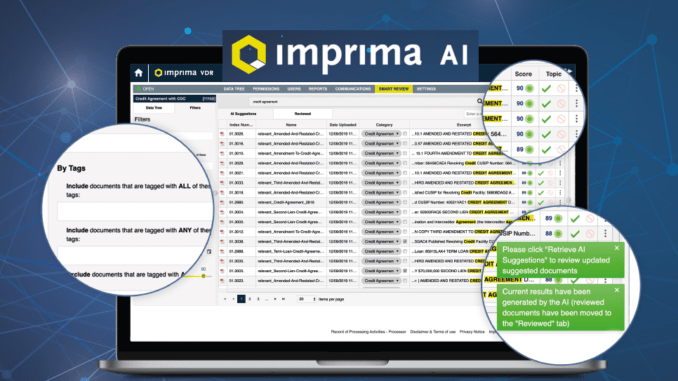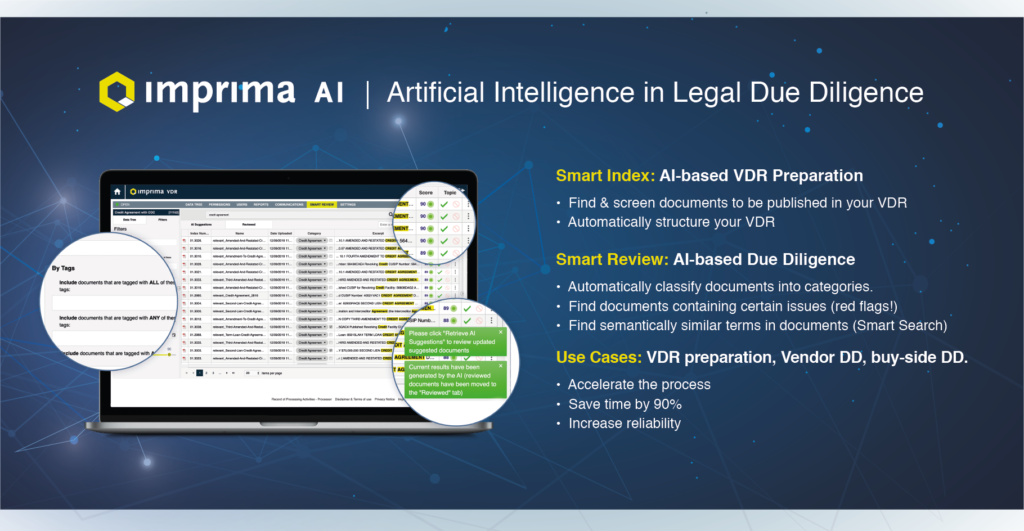
Virtual Data Room (VDR) pioneer, Imprima, has launched its own in-built AI doc review system that will provide a ‘one-stop-shop’ due diligence platform to clients and law firms.
The move is a highly logical one, given that VDRs are where clients place their docs for review by legal teams. Adding an internal NLP review system is an efficient way of keeping multiple activities together. This means that all that unstructured data doesn’t have to be shipped out to other AI software suppliers to do the review work – instead it can be kept all in one place – or at least that’s the theory.
Imprima was an early pioneer in the VDR field, starting in 2001 with a focus initially on M&A work, as well as real estate, IPOs and corporate restructuring projects. In 2017 they started to explore the use of NLP tools, and now they are going to market with their own doc review system: Smart Review – which for now is mainly focused on Due Diligence.

Pieter van der Made, the Executive Chairman of the company, told Artificial Lawyer: ‘We are unique in that we are a VDR that has its own AI integrated into it. Other VDRs are pushing data back and forth to doc review companies. Having to switch to another user interface is an inconvenience for the users.’
Van der Made’s point is clear: if you can keep everything together in one place it will make everyone’s lives easier.
What Imprima can do at present is rapidly sort out the documents inside the VDR by a number of variables, as well as provide the same type of clause-based ‘search and surface’ work for specific clauses that other leading AI doc review companies now provide.
‘This is a system that is trained as you do the review work,’ he added.
Of course, as with all machine learning systems, much depends on how the user works with it. But, in this regard Imprima is in the same situation as other AI doc review companies when they’re not operating off pre-set NLP toolsets.
But, can Imprima gain a competitive advantage over the current doc review players, some of which have been developing their software for several years? Van der Made stressed the point that NLP software is now a ‘level playing field’, as it is provided by multiple large companies and can then be adapted to a legal use case.
‘We focus on the data and the information problem, rather than writing algorithms,’ he added.
No doubt rivals in the market would possibly disagree with this, especially those that have spent years perfecting pre-set NLP tools for very specific types of document and use case. But, on one level he is certainly right – the basic, vanilla NLP software needed to get started on this is widely available.
And if you’ve got a system where in effect the users are training the NLP system as they work through the review you are perhaps able to do this. Plus as with all machine learning platforms, things will improve and get refined.
Of course, surfacing certain clauses is one thing, really getting into detailed analysis of very granular data points inside large doc sets is another thing. But, Imprima, like every other machine learning software business, has got to start somewhere.
Which raises the question: where is Imprima heading with this? Is this just a sideline, or will this become a core part of a business that has existed for almost 20 years?
Van der Made is clear: ‘We are really going for it. We believe this will transform due diligence.’
He added that huge amounts of time are spent finding data inside organisations and that if they can help to reduce that time then they’ll have a significant beneficial impact.
And, more broadly, where is the company heading? Van der Made explained that they have around 60 staff and are funded by their own cash flow and don’t need external investment. They will keep going like this.
Final question: aren’t there already a lot of companies in the doc review field?
Van der Made replied that may be true, but the others don’t have what they have, i.e. a well-known, and tried and tested VDR, which also comes with a long list of clients who have been choosing Imprima for many years. That is a clear advantage and a differentiator.
Will it succeed? We will see soon enough, but they have every chance to make an impact, especially with those who want a ‘one-stop-shop’.